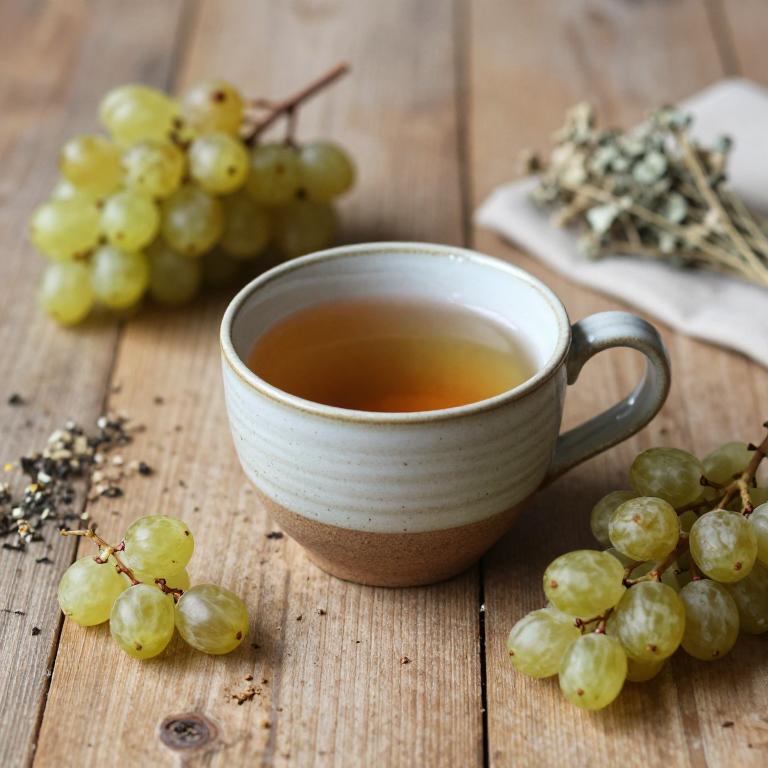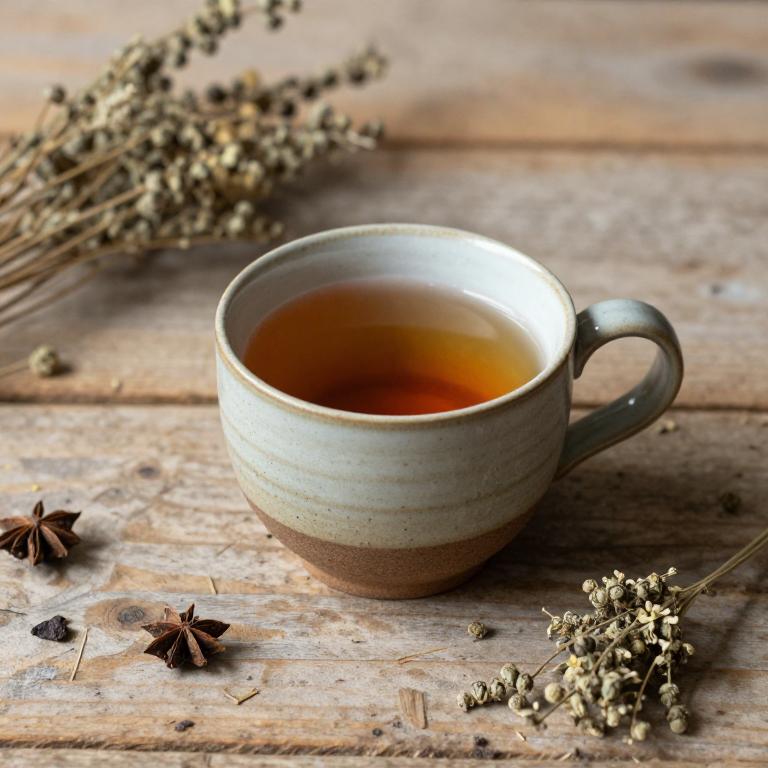10 Best Herbal Teas For Joint Stiffness

Herbal teas can be a natural and soothing remedy for joint stiffness, offering anti-inflammatory and pain-relieving properties without the side effects of pharmaceuticals.
Common herbs used in these teas include turmeric, ginger, and willow bark, which are known for their ability to reduce inflammation and ease muscle and joint discomfort. Drinking these teas regularly may help improve circulation and support the body's natural healing processes. Many people find relief by incorporating herbal teas into their daily routine, especially when combined with other holistic approaches like gentle exercise and proper nutrition.
However, it's important to consult with a healthcare provider before using herbal remedies, especially if you have underlying health conditions or are taking other medications.
Table of Contents
- 1. Turmeric (Curcuma longa)
- 2. Ginger (Zingiber officinale)
- 3. Field horsetail (Equisetum arvense)
- 4. Salvia (Salvia officinalis)
- 5. Common grape (Vitis vinifera)
- 6. Thistle (Silybum marianum)
- 7. Dog rose (Rosa canina)
- 8. Licorice (Glycyrrhiza glabra)
- 9. Indian frankincense (Boswellia serrata)
- 10. Stinging nettle (Urtica dioica)
1. Turmeric (Curcuma longa)

Curcuma longa, commonly known as turmeric, is a popular herbal remedy used in teas to alleviate joint stiffness due to its high concentration of curcumin, a compound known for its anti-inflammatory and antioxidant properties.
When consumed as a herbal tea, turmeric can help reduce inflammation in the joints, making it a natural alternative for those seeking relief from conditions like arthritis. The bioavailability of curcumin is often enhanced when combined with black pepper or healthy fats, which can improve the effectiveness of the tea. Regular consumption of turmeric tea may support long-term joint health and mobility, though it is advisable to consult a healthcare professional before starting any new herbal regimen.
Overall, curcuma longa herbal teas offer a soothing and potentially beneficial approach to managing joint stiffness naturally.
2. Ginger (Zingiber officinale)

Zingiber officinale, commonly known as ginger, has been widely used in herbal teas to alleviate joint stiffness due to its anti-inflammatory and analgesic properties.
The active compounds in ginger, such as gingerol and shogaol, help reduce inflammation and pain in the joints, making it a popular natural remedy for conditions like arthritis. Drinking ginger tea regularly can improve circulation and ease muscle tension, contributing to reduced stiffness and enhanced mobility. Many people find that incorporating ginger into their daily herbal routine provides a gentle and effective way to support joint health.
However, it is advisable to consult with a healthcare provider before using ginger tea, especially for those with existing medical conditions or taking medications.
3. Field horsetail (Equisetum arvense)

Equisetum arvense, commonly known as field horsetail, has been traditionally used in herbal teas to support joint health and alleviate stiffness.
This plant is rich in silica, which is believed to strengthen connective tissues and reduce inflammation in the joints. When brewed into a tea, it may help improve flexibility and ease discomfort associated with conditions like arthritis. However, it is important to consult a healthcare provider before using it, as it can interact with certain medications.
Despite its potential benefits, more scientific research is needed to fully understand its efficacy for joint stiffness.
4. Salvia (Salvia officinalis)

Salvia officinalis, commonly known as sage, has been traditionally used in herbal teas to support joint health and alleviate symptoms of joint stiffness.
The plant contains compounds like rosmarinic acid and flavonoids, which possess anti-inflammatory and antioxidant properties that may help reduce inflammation and oxidative stress in the joints. Some studies suggest that regular consumption of sage tea could contribute to improved mobility and decreased discomfort in individuals with conditions such as arthritis. While more research is needed to fully understand its efficacy, many people report positive effects when incorporating sage into their wellness routine.
As with any herbal remedy, it is advisable to consult with a healthcare professional before use, especially for those with existing medical conditions or taking medications.
5. Common grape (Vitis vinifera)

Vitis vinifera, commonly known as the grape vine, has been traditionally used in herbal medicine for its potential benefits in alleviating joint stiffness.
The leaves and seeds of the Vitis vinifera plant are often used to make herbal teas that are believed to possess anti-inflammatory and analgesic properties. These teas may help reduce inflammation and pain associated with conditions like arthritis, making them a natural alternative for those seeking relief without pharmaceuticals. Some studies suggest that compounds found in Vitis vinifera, such as resveratrol, may support joint health by improving circulation and reducing oxidative stress.
While more research is needed, many individuals report feeling a sense of comfort and reduced stiffness after regular consumption of Vitis vinifera herbal teas.
6. Thistle (Silybum marianum)

Silybum marianum, commonly known as milk thistle, is a herbal remedy that has been traditionally used for its potential health benefits, including support for joint health.
While it is best known for its liver-protecting properties, some studies suggest that silybum marianum may also help reduce inflammation and alleviate symptoms of joint stiffness. The active compound, silymarin, is believed to have anti-inflammatory and antioxidant effects that could contribute to improved joint mobility. However, more clinical research is needed to fully understand its efficacy for joint stiffness.
As with any herbal supplement, it is advisable to consult with a healthcare professional before incorporating silybum marianum into a wellness routine.
7. Dog rose (Rosa canina)

Rosa canina, also known as rosehip, is a traditional herbal remedy commonly used to alleviate joint stiffness and support joint health.
The tea is made from the dried berries of the rose plant and is rich in antioxidants, vitamins, and anti-inflammatory compounds. Regular consumption of rosa canina herbal tea may help reduce inflammation and improve mobility in individuals suffering from conditions like arthritis. Its natural properties make it a popular choice for those seeking a gentle, plant-based approach to managing joint discomfort.
However, it is advisable to consult with a healthcare professional before incorporating it into a treatment regimen, especially for those with existing medical conditions or taking other medications.
8. Licorice (Glycyrrhiza glabra)

Glycyrrhiza glabra, commonly known as licorice root, has been traditionally used in herbal medicine for its anti-inflammatory and soothing properties.
When brewed into a tea, licorice root may help alleviate joint stiffness by reducing inflammation and supporting overall joint health. The active compounds in licorice, such as glycyrrhizin and flavonoids, are believed to contribute to its potential therapeutic effects on the musculoskeletal system. However, it is important to note that while some individuals report relief from joint discomfort when using licorice tea, more research is needed to confirm its efficacy and safety for long-term use.
As with any herbal remedy, it is advisable to consult a healthcare professional before incorporating licorice root tea into a treatment regimen for joint stiffness.
9. Indian frankincense (Boswellia serrata)

Boswellia serrata, also known as Indian frankincense, is a herbal remedy commonly used in traditional medicine for its anti-inflammatory properties.
When brewed into a tea, boswellia serrata may help alleviate joint stiffness by reducing inflammation and supporting cartilage health. The active compounds in boswellia, such as boswellic acids, inhibit enzymes that contribute to joint degradation and pain. Regular consumption of boswellia serrata tea is often recommended as a natural complement to other joint-supporting practices.
However, it is important to consult with a healthcare provider before incorporating this herb into one's routine, especially for individuals with existing health conditions or those taking medications.
10. Stinging nettle (Urtica dioica)

Urtica dioica, commonly known as stinging nettle, has been traditionally used in herbal teas to support joint health and alleviate symptoms of stiffness.
The plant contains anti-inflammatory compounds such as flavonoids and polyphenols, which may help reduce inflammation and pain in the joints. When brewed into a tea, stinging nettle can provide a gentle, soothing effect that may ease discomfort associated with conditions like arthritis. However, it is important to consult a healthcare provider before use, especially for individuals with existing medical conditions or those taking medications.
Regular consumption of urtica dioica tea may contribute to improved mobility and overall joint wellness when used as part of a holistic approach to health.